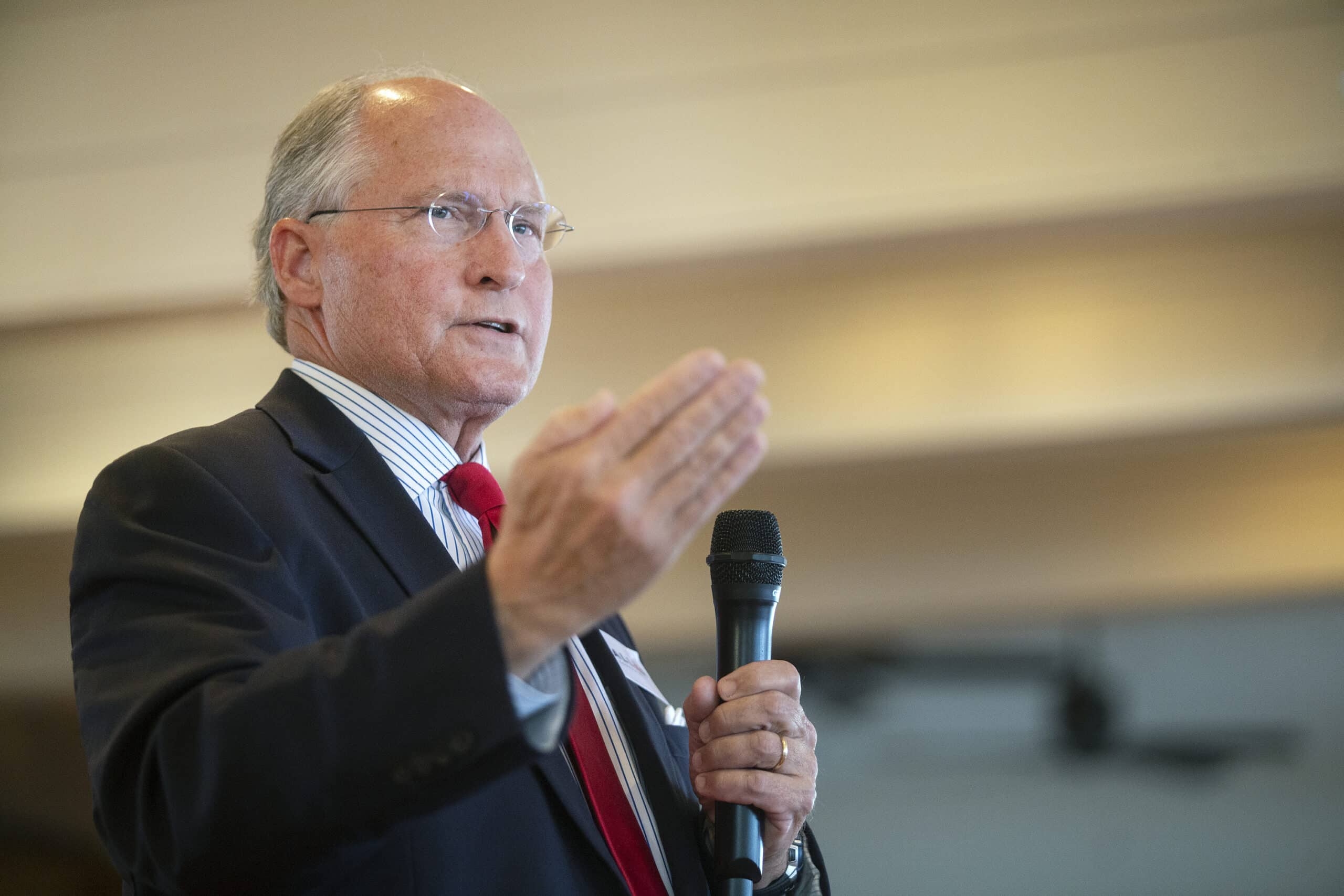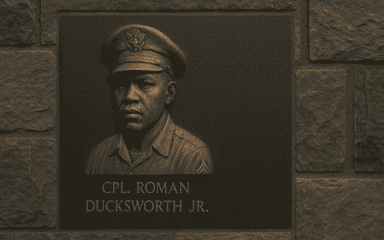Mississippi Today
Bill Waller’s 2019 campaign is still haunting Gov. Tate Reeves

Welcome to The Homestretch, a daily blog featuring the most comprehensive coverage of the 2023 Mississippi governor’s race. This page, curated by the Mississippi Today politics team, will feature the biggest storylines of the 2023 governor’s race at 7 a.m. every day between now and the Nov. 7 election.
Four summers ago, Bill Waller Jr. had Tate Reeves on the ropes.
Waller, the former Mississippi Supreme Court chief justice who challenged Reeves in the 2019 GOP primary, had forced the powerful lieutenant governor into a runoff after Reeves’ allies had spent months downplaying his primary challenger.
What began as a modest campaign for Waller swiftly picked up steam. He was earning notable support from suburban Republicans. Respected GOP party leaders spoke highly of him and several even endorsed him. In the run-up to the primary, it was clear that Waller was a force for Reeves to reckon with.
READ MORE: ‘I think he’s more electable than Tate’: Four past GOP chairmen endorsed Waller over Reeves
The reason for that was simple: a fresh, new-to-the-modern-GOP platform. Waller ran on three major issues that year that few previous Republicans had: raising the state’s lowest-in-the-nation teacher pay, improving the state’s crumbling roads and bridges, and expanding Medicaid to save sick Mississippians and struggling hospitals. And on those three issues, Reeves got absolutely blasted.
Teachers groups torched Reeves for his years of inaction on teacher pay. Roadbuilders admonished Reeves for not committing to improving the state’s crumbling infrastructure. Hospital leaders flocked to support Waller when Reeves famously dug his heels in on his refusal to allow Medicaid expansion.
We know the rest of the story. Reeves ultimately won the runoff by about 28,000 votes. But in the process, Waller defeated Reeves in 17 counties, including Reeves’ home county Rankin (Reeves lost by 20 percentage points in his own home precinct). So many Mississippi Republicans had rebuked Reeves’ positions on those three main issues.
So Reeves, after he won the general election later in 2019, responded.
In his first four years as governor, Reeves checked off two of those three major Waller platforms — though one should deeply scrutinize whether Reeves was truly responsible for either accomplishment.
In 2022, lawmakers passed the largest teacher pay raise in state history, which Reeves gladly signed into law and is now, interestingly, taking credit for. In 2023, lawmakers appropriated a heap of funds to the Mississippi Department of Transportation, which Reeves also signed. (Plus, the state is benefitting profoundly from President Joe Biden’s infrastructure bill.)
But Reeves never did get around to addressing that third successful Waller platform idea: Medicaid expansion. In fact, Reeves has quadrupled down on his resistance to it. Most people blame Reeves solely for Mississippi not joining 40 other states — including many Republican-controlled ones — in passing the reform that would provide health care to at least 200,000 poor, working people.
Today, Reeves faces the same headwinds he faced in that 2019 primary against Waller. Democratic challenger Brandon Presley has made Medicaid expansion — and Reeves’ refusal to accept it — one of two main planks of his platform.
But this year, Presley has something that Waller didn’t have four years ago: a borderline insurmountable hospital crisis that every Mississippian is deeply familiar with.
Today, almost half of Mississippi’s rural hospitals are at risk of closure, according to one report. Many financially struggling hospitals cite major losses on uncompensated care, or services provided to people without health insurance coverage — emergency rooms by law cannot turn patients away, regardless of their coverage status.
Mississippi, which is home to one of the highest percentages of uninsured residents, continues to rank as the least healthy state in the nation. We are leading the nation in so many negative health outcome rankings.
READ MORE: Why so many top candidates are ignoring Mississippi’s worsening hospital crisis
A big solution to these problems, Presley has argued, just like Waller argued in 2019, is Medicaid expansion. As the health care crisis worsens, more Republicans than ever before support Medicaid expansion. In multiple polls conducted this year, more than 50% of Republican voters said they support expansion. Even incoming Republican Speaker of the House Jason White publicly says lawmakers will consider expansion in 2024, and that his party deserves criticism for refusing to consider it.
Reeves, meanwhile, is struggling to reach 50% support in polling ahead of the Nov. 7 election, and political operatives on both sides are preparing for the first general election runoff in state history, which would occur on Nov. 28.
Waller, who publicly considered but decided against challenging Reeves again in the 2023 GOP primary, must be asking himself how differently his 2019 primary runoff would’ve gone had the hospital crisis been at the forefront like it is in 2023.
In November, Presley just might be able to answer that question for him.
READ MORE: Bill Waller did not endorse Tate Reeves in 2019 governor’s race
Headlines From The Trail
Tight governor’s race has Tate Reeves putting in the shoe leather
Democrats keep hammering Gov. Tate Reeves for refusing Medicaid expansion
‘Help’s on the way’: What Presley plans to do for students, Mississippians
Mississippi should set minimum wage higher than federal level, says Democrat running for governor
There will be major U.S. elections next month. Here are some to watch.
What We’re Watching
1) Brandon Presley on Tuesday called for an increase in Mississippi’s $7.25-per-hour minimum wage. It’s an interesting position to take late in a campaign, and one that has earned some bipartisan support in several other states. Many people in Mississippi, home to the nation’s lowest median household income and highest poverty rate, may appreciate the proposal. But not everyone. On Wednesday, a conservative blogger panned Presley’s proposal as “a familiar Democratic tune.”
2) Tate Reeves and Brandon Presley will be at the Mississippi Economic Council’s annual Hobnob event, where business leaders from across the state will hear speeches from candidates for statewide offices. It’s one of very few times this cycle where the two candidates have been in the same room. Presley speaks at 11:25 a.m., and Reeves speaks at 11:50 a.m.
3) Reeves is expected to travel to Oxford on Thursday evening for the annual Good Ole Boys and Gals event. A Mississippi political tradition for about 30 years, this gathering at a shed in the woods allows people to eat barbecue, then grill Mississippi political candidates one-on-one. Four years ago, when Reeves was running for a first term in office, Donald Trump Jr. attended the event. Might there be another high-profile guest this year?
This article first appeared on Mississippi Today and is republished here under a Creative Commons license.
Did you miss our previous article…
https://www.biloxinewsevents.com/?p=299801
Mississippi Today
Government secrecy tends to bite Mississippi in the butt. It’s happened again
The state Senate Republican leadership didn’t plan to fail on a Mississippi tax overhaul. It failed to plan.
And when pressed late in the 2025 legislative session to come up with a proposal to counter the House Republican leadership’s sweeping bill, Senate leaders did so behind closed doors and hurriedly.
The result: a majority of legislators passing a tax overhaul bill full of math errors that accidentally did what Senate leaders didn’t want. And it stripped out safeguards for taxpayers that both the House and Senate leadership said were prudent.
No matter how much Gov. Tate Reeves praises House Bill 1 as “one big, beautiful bill,” borrowing a phrase from President Trump as he signed it into law, it was passed through secrecy, subterfuge and error, not representative democracy.
Had the Senate perhaps taken a little more time, allowed more input from and access to its strategizing from rank-and-file lawmakers, and who knows, maybe even a little crowd-sourcing allowing the public to scrutinize the bill before passing it, maybe the blunder could have been prevented.
READ MORE: OOPS! Senate sent House an income tax bill with typos. House ran with it. What’s next?
And while House leaders should receive praise for coming up with an initial public-facing tax overhaul plan through months of public hearings and forums, that’s not what was passed into law. House leaders played a game of secret squirrel to pass the Senate’s mistakes into law. Then instead of negotiating in good faith to fix the problems, House leaders tried to shanghai the Senate in backroom negotiations to pass a few plums they wanted, such as legalized online sports betting and a sales tax increase.
The end result: Historically bitter infighting among state GOP leaders to the point they couldn’t even pass a state budget, their main job. And we have communications between Mississippi’s top legislative leaders and governor, all Republicans, that these days are often reduced to mean tweets or Facebook posts about each other, not earnest negotiations.
READ MORE: The Typo Tax Swap Act of 2025 may be the most Mississippi thing ever
Mississippi government’s default setting is secrecy, from public records and meetings to access to elected officials, and it has never served our citizens well. From a black-ops agency that spied on its citizens for nearly two decades to festering, generational government corruption that has cost taxpayers hundreds of millions of dollars, secrecy is neither good politics nor good policy.
Major, sweeping state policy should be conducted in the open and with public input. But as the national and world economies plunge into turmoil that is sure to impact Mississippi, our new tax code lacks safeguards that both House and Senate leaders said were needed — all because of secrecy and lack of planning and communication.
This article first appeared on Mississippi Today and is republished here under a Creative Commons Attribution-NoDerivatives 4.0 International License.
Mississippi Today
Ward 6 council candidates face the image of south Jackson versus the reality
Driving down roads in south Jackson in recent weeks, residents were inundated with placards of smiling faces and names in bright, bold fonts of people hoping to be the next Ward 6 councilman.
In some neighborhoods, the streets were as littered with campaign signs as they are overgrown lots and abandoned properties in between neatly kept homes.
“The homes in the surrounding area and businesses in Ward 6 have been decimated. It looks like a bomb went off,” said Sylvia Walker, Ward 6 board member for the Jackson Association of Neighborhoods. “We’ve seen the businesses hollow out and nothing come back in. It’s disheartening. It’s sad.”
Walker said the image of south Jackson must be interrogated. Not enough people are talking about the good happening in Ward 6, she said.
“South Jackson is very diverse and not just one specific area,” said Walker. “I think the biggest misconception is that south Jackson is just full of dilapidated homes, and the people are poverty-stricken and destitute, and that’s not true.”
Ward 6 has the largest population of Jacksonians, with just over 23,000 people. It also has the highest number of Black residents, according to data from the City of Jackson’s website.
Jackson also has a high number of abandoned properties owned by the state. According to data from the Secretary of State’s office, there are about 1,900 tax-forfeited properties in the City of Jackson.
There will be a Democratic runoff on April 22 between two candidates for the Ward 6 city council seat. Emon Thompson Sr. garnered 714 votes and Lashia Brown-Thomas came in second with 652 votes. Voter turnout was low, with less than 3,200 votes cast in a ward with a voting age population of more than 16,000. There were nine contenders for the coveted council seat, more than any other council race.
Candidates for the coveted Ward 6 seat envision a more beautiful, thriving south Jackson. After a stacked primary, two candidates have made it to the runoff to replace Aaron Banks, former council person who faces criminal charges for allegedly accepting cash bribes in exchange for his vote on a development project. He pleaded not guilty.
Banks is familiar with the image problem in south Jackson. He said he’s made progress with more demolitions and landscaping work done than others in the past. This includes the demolition of Casa Grande Apartments and Appleridge Shopping Center.
“I’ve always said that I would serve two terms, and we got a lot of work done,” Banks said in a recent interview with Mississippi Today.
Brown-Thomas said that crime and blight are the biggest issues affecting Ward 6. The law enforcement officer wants to hold people accountable for their part in the perceived image of a decaying south Jackson.
“The city has codes, and if these people are not holding up to the codes, they need whatever punishment there is,” Brown-Thomas said. “If they aren’t holding the property up, then they should not have the property.”
She said that if she’s elected, she’ll work to get police officers higher wages, and will remain transparent and available to constituents.
“It’s not going to happen overnight, but it will take some time,” Brown-Thomas said. “I’m not saying it’s going to come in a year, not even two years, but we have to address the issues first, then everything else will fall in line.”

Thompson Sr., a business owner and retired veteran, said that a lot of the issues with blight comes down to enforcement.
“We need to, first of all, clean up our blighted properties by using the laws that we already have,” Thompson said. “The city already has ordinances with enough teeth to deal with blight.”
South Jackson voters don’t turn out like they should, he said, which can lead to a distrust in the system. He hopes, if elected, to be able to reach constituents where they are and keep them a part of the process in restoring their communities, like water improvement or curbing crime.
“Out of the 40 something thousand people that’s in south Jackson, maybe 3,900 people vote in the municipal elections,” he said. “They don’t have faith in the government anymore.”
“…If there’s a reason why we’re not getting any services out here, then I want to make sure I communicate that with a constituent so they can continue to have hope,” he said.
Representative Ronnie Crudup, Jr., D-Jackson, said that residents’ migration out of Jackson creates bigger issues for communities.
“To me, blight is just a symptom of a larger problem. The people are leaving the city of Jackson, and the population is decreasing,” Crudup said. “When people leave the properties, you end up with squatters and vagrants who move into these properties and tear them up.”
Crudup has been renovating and demolishing blighted properties in south and west Jackson for nearly eight years. So far, he said he’s renovated about 35 homes.
“Even though we are demoing and tearing down one or two properties, when people leave, that leaves other ones there,” he said. “You got all these blighted properties all around south and west Jackson, and some even in parts of north Jackson now, because people are leaving.”
He said the one thing that’s needed most: more funding from all levels of government for blight mitigation work.
“There needs to be more money from the legislature, but there needs to be more money allocated from the city council too,” Crudup said. “I think the city is going to have to take clean up efforts to a higher circumstance, and let the legislature see that they’re serious about this, and also get the county involved and let them know ‘Hey, we need all the help we can get.’”
And, the perception that city leaders have abandoned south Jackson is not necessarily right. Former Jackson Mayor Harvey Johnson said that blight is an issue that affects not only south Jackson but all parts of the city. Mitigating blight is going to take an intergovernmental approach, he said.
“I know that in some cases, some people feel they’ve been sort of abandoned, but I don’t think that’s the case,” Johnson said. “It may be a lack of resources to attack the problem and it’s going to require all governments to work together.”
Walker said she remembers when the city’s southern boundary changed and her neighborhood, which had been part of Byram, came inside Jackson city limits. A small portion of her ward was annexed by the city of Jackson in 2006 as part of Byram’s reincorporation. In the last couple of decades, she said she’s seen people be forced out of their homes due to the recession. Others simply chose to leave.
“We’ve had a turnover, but the neighborhood is still relatively stable,” Walker said. “When we moved in, a lot of people moved out.”
Walker said that while her neighborhood isn’t struck by blight, she sees abandoned properties while making her way through the community and near her church.
When thinking of a candidate that she would want to vote for, Walker said she’s looking for a good communicator who can be an advocate for the ward.
“We need someone that’s forward thinking. Someone that has the best interests of the residents of south Jackson and an understanding of the vast diversity of the ward,” she said. “Someone that’s able to work with other members of the City Council. Someone able to work with our board of supervisors and state legislators to find solutions to some of these issues.”
Banks said that his greatest achievement as city councilman was hosting quarterly town hall meetings to inform his constituents on the importance of ordinances and legislation created to better their lives.
“There’s one piece of legislation that deals with overhanging tree limbs and limbs. That idea came from a constituent,” he said. “When you see constituents being able to give informed ideas on legislation, which is the job of a council member, I think that’s an achievement because then what that says is there’s involvement in the process.”
“I hope the next person will understand that communicating with the people is key, and that the people of Ward 6 are resilient,” Banks said. “As long as they continue to communicate and stay in the scope of their job and work with the administration, there’s a lot that can be done.”
This article first appeared on Mississippi Today and is republished here under a Creative Commons Attribution-NoDerivatives 4.0 International License.![]()
Mississippi Today
On this day in 1962, white cop killed Cpl. Roman Ducksworth
April 9, 1962

Cpl. Roman Ducksworth Jr., a 27-year-old Black military police officer stationed at Fort Ritchie, Maryland, was traveling home by bus to Mississippi. His wife, Melva, was expecting their sixth child and was now in the hospital because of complications.
By the time he arrived home in Taylorsville, Mississippi, he had fallen asleep. The driver called William Kelly, a white police officer onto the bus to wake him. Kelly instead arrested the serviceman, claiming he was drunk.
Off the bus, the two struggled, and the officer shot twice, striking Ducksworth in the chest. He died without knowing his wife had just given birth to a healthy baby girl. Kelly claimed he shot Ducksworth in self-defense, and he was never prosecuted.
Later he sent a message to Ducksworth’s father: “If I’d known it was your son I wouldn’t have shot him.” The father replied, “I don’t care whose son it was, you had no business shooting him.”
More than 2,000 attended the funeral for Ducksworth, who was buried with full military honors, including a 16-gun salute by an integrated honor guard. He is among 40 martyrs listed on the Civil Rights Memorial in Montgomery, Alabama.
This article first appeared on Mississippi Today and is republished here under a Creative Commons Attribution-NoDerivatives 4.0 International License.![]()
-

 News from the South - South Carolina News Feed6 days ago
News from the South - South Carolina News Feed6 days agoSouth Carolina clinic loses funding due to federal changes to DEI mandates
-

 News from the South - Kentucky News Feed7 days ago
News from the South - Kentucky News Feed7 days ago3 killed in fiery Lexington crash temporarily shuts down portion of New Circle Road
-

 The Center Square5 days ago
The Center Square5 days agoCA fails audit of federal programs, 66% of COVID unemployment benefits in question | California
-

 News from the South - Alabama News Feed7 days ago
News from the South - Alabama News Feed7 days agoMobile defendants sentenced to life in prison for murder-for-hire conspiracy
-

 News from the South - Arkansas News Feed6 days ago
News from the South - Arkansas News Feed6 days agoArkansas prison board approves contractor search for Franklin County prison
-

 News from the South - Georgia News Feed6 days ago
News from the South - Georgia News Feed6 days agoBond hearing for man accused of murdering pregnant ex | FOX 5 News
-

 News from the South - Alabama News Feed4 days ago
News from the South - Alabama News Feed4 days ago‘Hands Off!’ Protest Held in Huntsville Saturday | April 5, 2025 | News 19 @ 9 P.M.
-

 News from the South - Alabama News Feed7 days ago
News from the South - Alabama News Feed7 days agoAlabama immigration enforcement bill gets approval from 2nd House committee















































